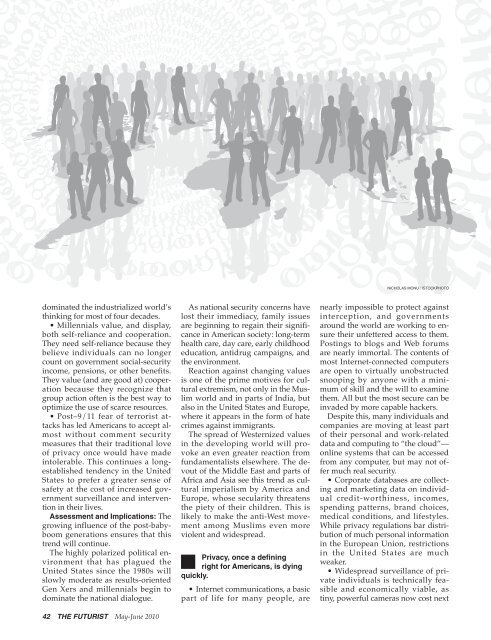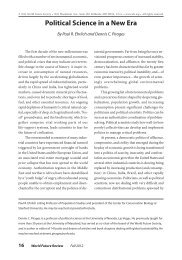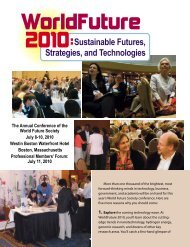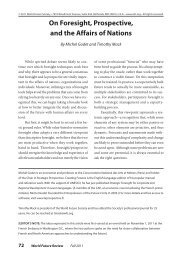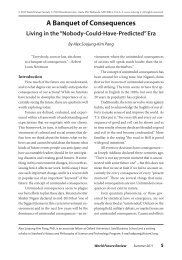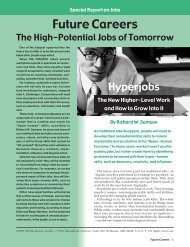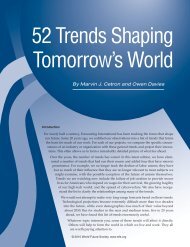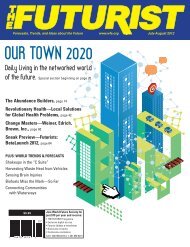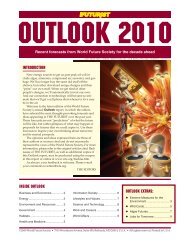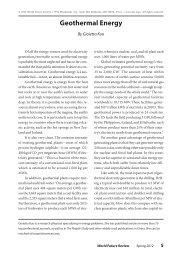Trends Shaping Tomorrow's - World Future Society
Trends Shaping Tomorrow's - World Future Society
Trends Shaping Tomorrow's - World Future Society
Create successful ePaper yourself
Turn your PDF publications into a flip-book with our unique Google optimized e-Paper software.
NICHOLAS MONU / ISTOCKPHOTO<br />
dominated the industrialized world’s<br />
thinking for most of four decades.<br />
• Millennials value, and display,<br />
both self-reliance and cooperation.<br />
They need self-reliance because they<br />
believe individuals can no longer<br />
count on government social-security<br />
income, pensions, or other benefits.<br />
They value (and are good at) cooperation<br />
because they recognize that<br />
group action often is the best way to<br />
optimize the use of scarce resources.<br />
• Post–9/11 fear of terrorist attacks<br />
has led Americans to accept almost<br />
without comment security<br />
measures that their traditional love<br />
of privacy once would have made<br />
intolerable. This continues a longestablished<br />
tendency in the United<br />
States to prefer a greater sense of<br />
safety at the cost of increased government<br />
surveillance and intervention<br />
in their lives.<br />
Assessment and Implications: The<br />
growing influence of the post-babyboom<br />
generations ensures that this<br />
trend will continue.<br />
The highly polarized political environment<br />
that has plagued the<br />
United States since the 1980s will<br />
slowly moderate as results-oriented<br />
Gen Xers and millennials begin to<br />
dominate the national dialogue.<br />
42 THE FUTURIST May-June 2010<br />
As national security concerns have<br />
lost their immediacy, family issues<br />
are beginning to regain their significance<br />
in American society: long-term<br />
health care, day care, early childhood<br />
education, antidrug campaigns, and<br />
the environment.<br />
Reaction against changing values<br />
is one of the prime motives for cultural<br />
extremism, not only in the Muslim<br />
world and in parts of India, but<br />
also in the United States and Europe,<br />
where it appears in the form of hate<br />
crimes against immigrants.<br />
The spread of Westernized values<br />
in the developing world will provoke<br />
an even greater reaction from<br />
fundamentalists elsewhere. The devout<br />
of the Middle East and parts of<br />
Africa and Asia see this trend as cultural<br />
imperialism by America and<br />
Europe, whose secularity threatens<br />
the piety of their children. This is<br />
likely to make the anti-West movement<br />
among Muslims even more<br />
violent and widespread.<br />
■<br />
Privacy, once a defining<br />
right for Americans, is dying<br />
quickly.<br />
• Internet communications, a basic<br />
part of life for many people, are<br />
nearly impossible to protect against<br />
interception, and governments<br />
around the world are working to ensure<br />
their unfettered access to them.<br />
Postings to blogs and Web forums<br />
are nearly immortal. The contents of<br />
most Internet-connected computers<br />
are open to virtually unobstructed<br />
snooping by anyone with a minimum<br />
of skill and the will to examine<br />
them. All but the most secure can be<br />
invaded by more capable hackers.<br />
Despite this, many individuals and<br />
companies are moving at least part<br />
of their personal and work-related<br />
data and computing to “the cloud”—<br />
online systems that can be accessed<br />
from any computer, but may not offer<br />
much real security.<br />
• Corporate databases are collecting<br />
and marketing data on individual<br />
credit-worthiness, incomes,<br />
spending patterns, brand choices,<br />
medical conditions, and lifestyles.<br />
While privacy regulations bar distribution<br />
of much personal information<br />
in the European Union, restrictions<br />
in the United States are much<br />
weaker.<br />
• Widespread surveillance of private<br />
individuals is technically feasible<br />
and economically viable, as<br />
tiny, powerful cameras now cost next


